When designing a new bathroom, the material you use for the shower walls is one of the most visible and vital choices you can make. Shower time is generally the only time people can unwind with complete privacy. So, you must make this experience as relaxing as you can. Your shower wall material not only determines the ambiance of your bathroom but also offers various benefits.

With the correct material, you can add features like soundproofing and insulation to your showering space. However, searching for the perfect item can be tough with the several choices present in the market. We’ve researched and compiled a list of the best five materials for shower walls. You can thoroughly assess the pros and cons of every list item before selecting your best fit.
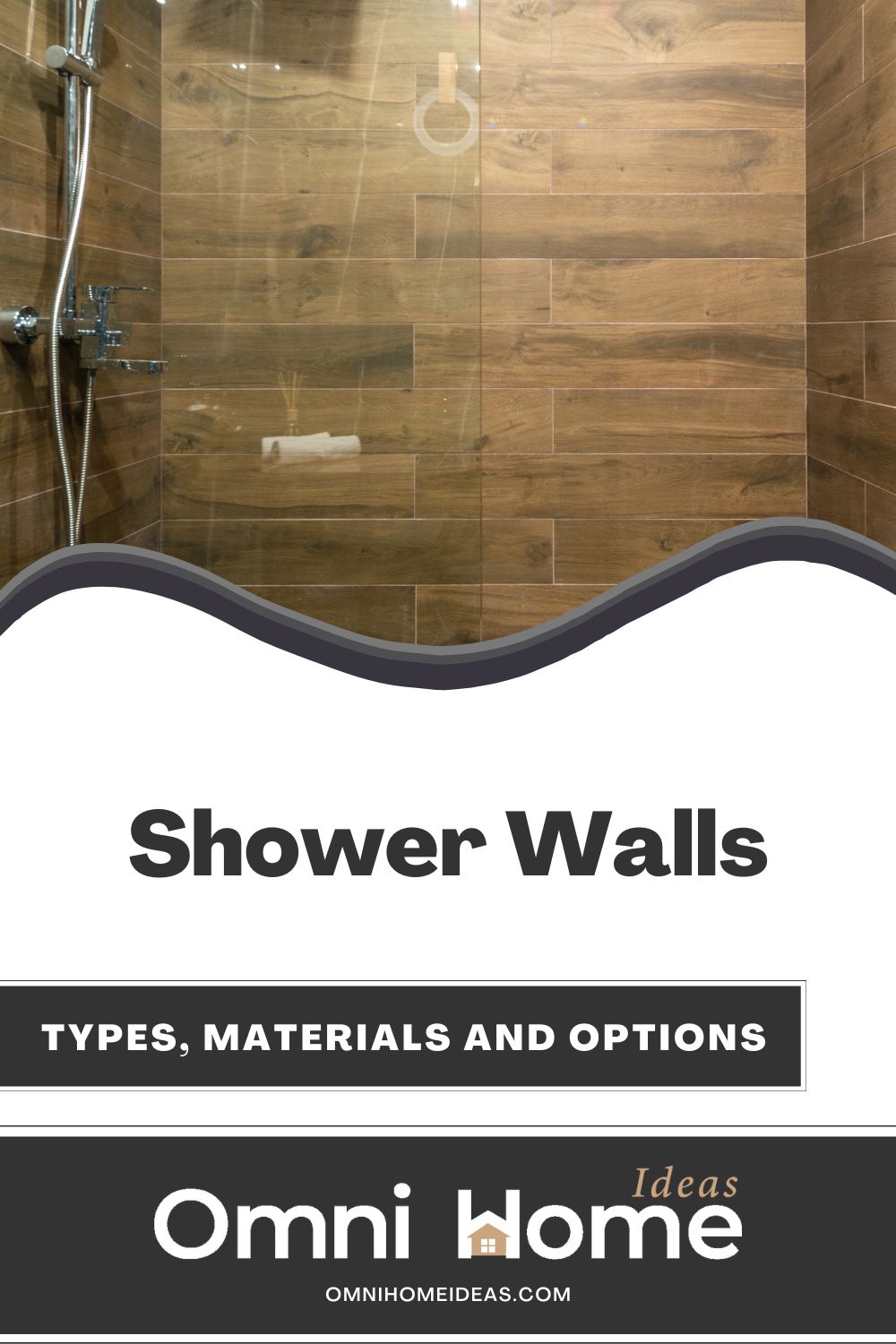
Types of Shower Walls and Designs
Before discussing what material is best for your shower wall, you must understand how to use it. Most shower areas have three designs: tiled showers, wall panels, or prefab shower stalls. This section discusses each design’s various features, pros, and cons.
Tiled Showers
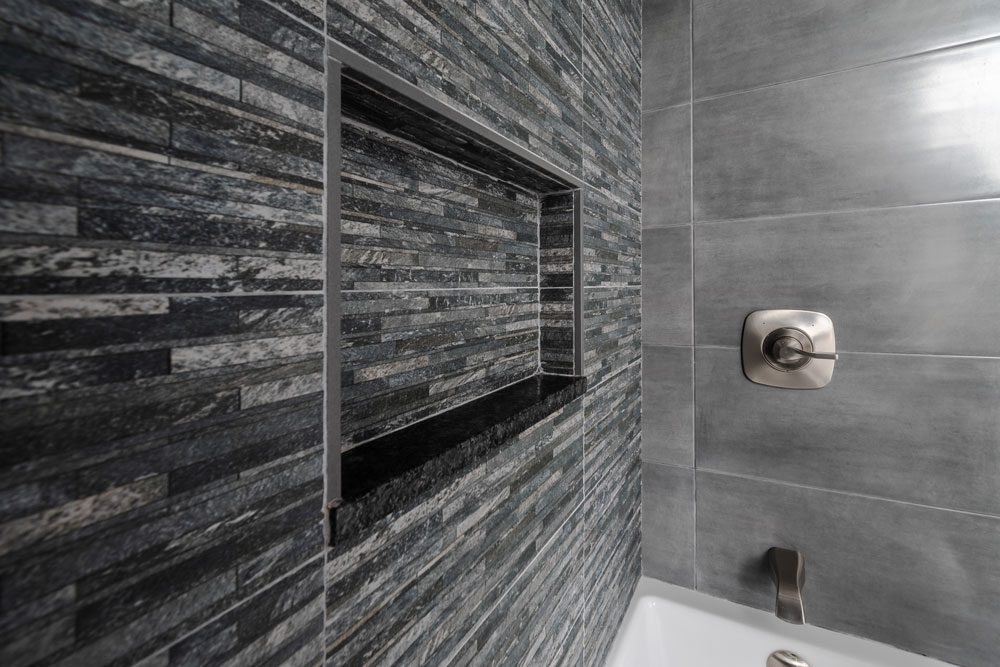
One of the most conventional approaches is installing tiled showers. Tiled showers are luxurious and prevent the shower area from molding easily. Moreover, this option is also easier to maintain in constantly wet environments. Ceramic tiles are beautiful and durable, but they can be more expensive and difficult to maintain than other options.
This option requires professionals to build your shower wall from scratch. While it may be laborious, it lasts longer than most other options. For an easier option, you can opt for stick on tiles. They are easy to install and save you time, money, and effort.
Wall Panels
If you want a cheaper option than replacing all the tiles in your shower, wall panels are your top choice. You can install these wall panels directly on your shower wall. Also, it will not affect your bathtub area or the shower head. This is the best solution when you don’t want to replace your current shower.
It’s also the least laborious alternative. You can stick these on top of your pre-existing shower tiles. In addition, you do not need to worry about mold or mildew since this option has no grout.
Prefab Shower Stalls
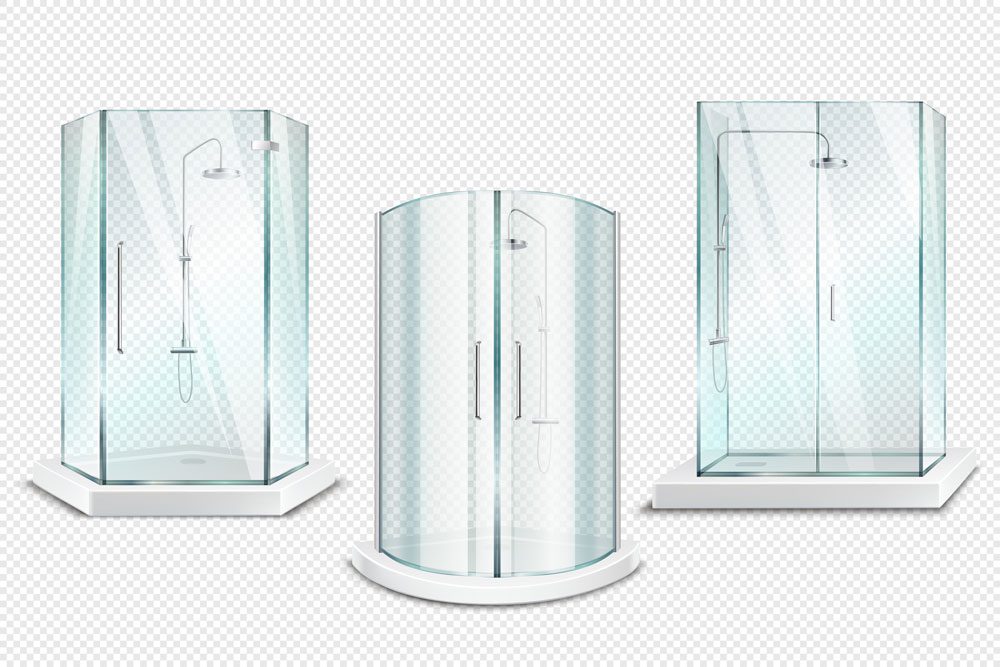
The last option is installing prefab, or prefabricated, shower stalls. It is the perfect choice if you want to remodel your entire shower from scratch without hassling about the tiles. You can purchase ready shower stalls online and place them in your shower without any lengthy procedures. So, you can even perform this task yourself. Most prefab shower kits come with an installation guide and do not require many tools.
There are usually three types of prefab shower stalls. You assess your needs and select amongst them accordingly.
- Multi-Part Kit – As the name suggests, this design has multiple parts that can fit together to form a smooth and lightweight shower stall interior. While the set usually has only shower pans or a bathtub, some designs also offer doors.
- Wall Kit – The second prefab option is similar to the wall panels you install on top of your tiles. However, prefab panels use slightly different materials than the former. It is also the easiest to install among all the prefab kits.
- One-Part Kit – The final prefab design has the least joints and requires minimal fixation labor. Thus, it is also the least likely to develop mold. However, since it comes in one piece, it might not be easy to deliver and adjust to your bathroom size.
Top 5 Shower Wall Materials and Types
Once you understand the different shower wall designs and installation methods, you must select what material to use. Here is a list of the best materials for your shower wall.
1. Acrylic
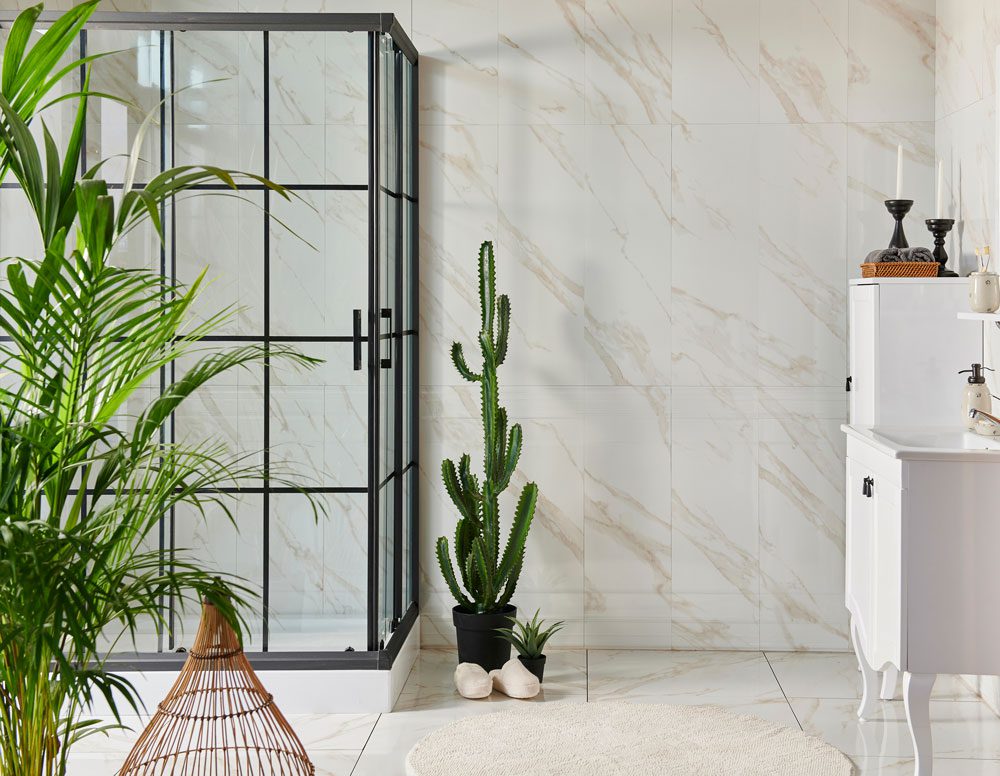
Acrylic is arguably the best material for your shower wall and interior design. It is cheap, easy to clean, and quick to install. Moreover, the material is versatile and comes in the form of tiles, prefab kits, and panels.
The material also has a smooth and sleek finish that makes your shower wall look alluring. Furthermore, you can select some light color options to make the shower stall look more spacious.
While most people prefer this material for its compact and modern style, some believe it looks cheap-looking. Acrylic is also relatively thin and might not be the best choice for soundproofing your shower.
Pros
- Modern and sleek
- Royal appearance
- Spacious look
Cons
- Thin
2. Fiberglass
Fiberglass is one of the most reliable shower wall materials. This material consists of polyester resin and glass fibers and has several valuable properties. Also, you can spray it with a gel coat to prevent the color from fading and preserve the luster. While acrylic is far more durable than fiberglass, the latter is much easier to repair in case of damage. Makers generally offer fiberglass in only specific sizes. So, if you focus more on aesthetics, you may not be able to find many style and texture options for this material.
Pros
- Easy to repair
- Easy to maintain
- Smooth finish
Cons
- Might fade quickly
- Easy to crack
3. Ceramic
Ceramics is another popular material for shower wall tiles, and they are also very cost-effective and low-maintenance. Further, if you plan your installation well, the tiles can last as long as 20 years. These are your best bet when it comes to protecting your tiles from regular wear and tear. However, they aren’t always the easiest to set up, and DIY setup isn’t always recommended.
Pros
- Highly durable
- Cost-effective
- Easy to clean
Cons
- Tricky to install
4. Porcelain
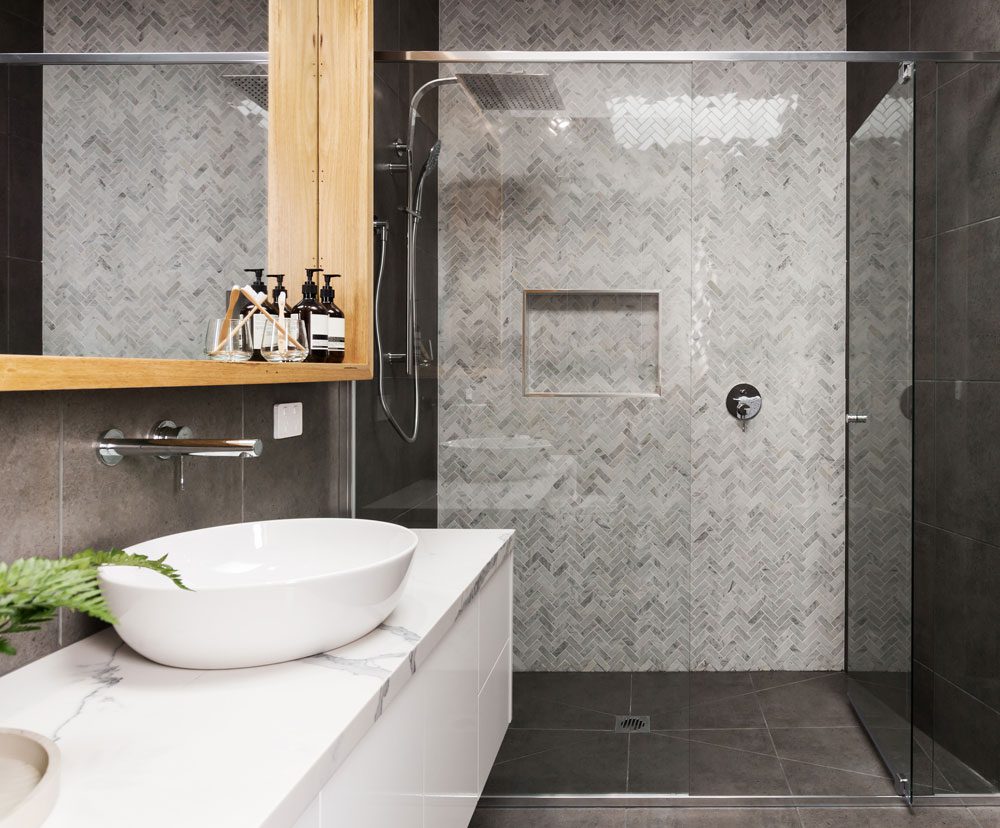
Porcelain is a type of ceramic. However, it is more robust and much more scratch-resistant than the others. Since these tiles are water-resistant, makers also popularly use them to create other wall panels and stall designs. You can also use porcelain tiles for flooring in your shower area. While they are better than standard ceramic tiles, they possess some of the latter’s drawbacks, like being cold and heavy.
Pros
- Durable
- Scratch-resistant
- Water-resistant
Cons
- Cold and heavyweight
5. Granite
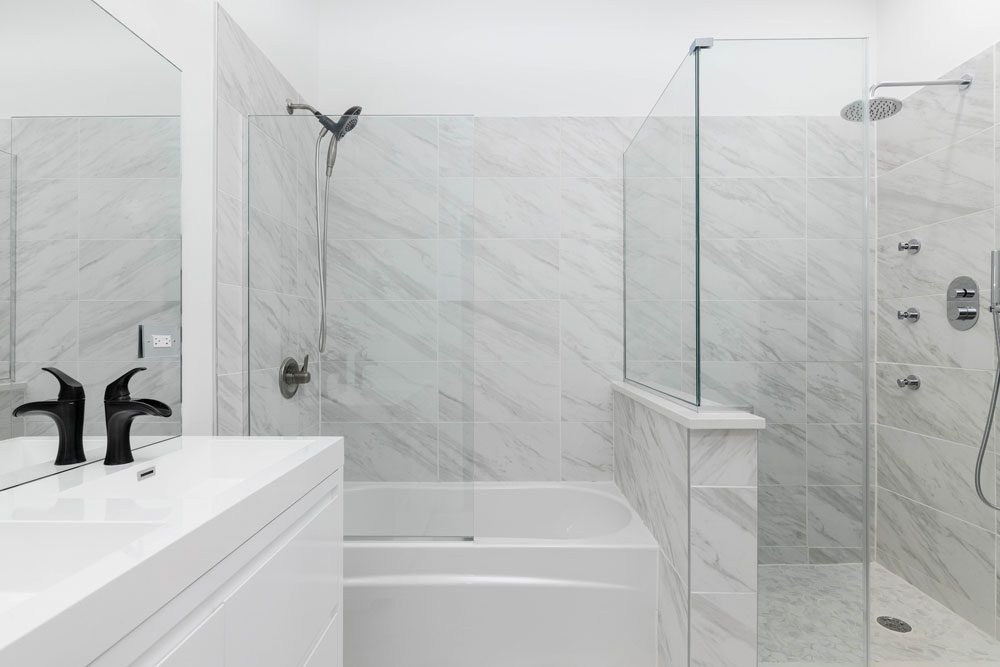
Granite is one of your top choices when selecting natural stone for your shower wall material. It is a highly porous material and has grout lines. So, the stone will give a neat and natural look to your shower interior. Moreover, while installing granite shower walls, you can add a sealant to strengthen them further and increase their durability. Lastly, you can style the stone as you like to form various designs. Using granite tiles could be a nice change from the square, diamond, or rectangular tiles.
Pros
- Porous with no grout lines
- Hardens with sealant for more durability
- Unique designs
Cons
- Requires regular maintenance
What to Consider Before Buying Shower Wall Material
It would help to consider several factors before selecting the right shower wall material. Once you have thoroughly read our list and assessed all your options, you must examine your needs. There is no one perfect choice of shower wall material for everyone. It all depends on your requirements. So, we have prepared a brief buying guide to help narrow your options.
1. Budget
Before selecting any material for their shower wall, every user’s primary concern is its price. People often settle for low-quality materials while settling for lower prices. However, this list offers the best-quality shower materials to fit all budgets.
The National Association of Realtors states that bathroom remodels have a 72.7 % average return on investment. So, for every USD$1,000 you spend on a bathroom remodel, you can expect a USD$727 increase in your home’s value.
Ceramic or porcelain shower tile is a great option if you’re considering upgrading your bathroom. It’s a beautiful and durable material that’ll significantly add value to your home.
2. Design
Another vital factor to consider before buying any shower wall material is determining what design you want for the interior. For example, granite is more suitable for tiles, while acrylic can be used in both panels and tiles.
A bathroom remodel expert can help you navigate through various design options and choose the best material based on your preferences, budget, and the overall aesthetic you want to achieve in your bathroom. You must consider the maintenance requirements, durability, and ease of installation when making your decision. Ultimately, selecting the right design for your shower walls can significantly enhance the appearance and functionality of your bathroom space.
3. Space
If you are purchasing ready-to-install kits or prefab shower walls in any material, you must account for space. If you buy one-piece kits, they may not fit through your home or bathroom door. So, you must select tiles, panels, or multi-part kits for small entryways.
Some materials, such as flexible acrylic or fiberglass panels, can be bent or folded to fit through tight spaces. These materials offer more flexibility in terms of installation compared to rigid materials like stone or tile. Many manufacturers offer custom sizing options for their products, allowing you to tailor the panels or kits to your space requirements. If you’re uncertain about the best approach to accommodate space limitations, consult with a professional installer or contractor. They can provide expert advice and may even offer custom installation services to ensure the perfect fit for your bathroom.
4. Durability
A good shower material should withstand the elements, including water, steam, and mold, helping prevent plumbing problems. For instance, porcelain tiles are like ceramic tiles, but they’re more durable and resistant to staining.
Granite, marble, and slate are known for their durability and resistance to water damage, capable of withstanding high levels of moisture and are less prone to staining compared to ceramic or porcelain tiles. Engineered stone products like quartz offer excellent durability and resistance to water and stains. They are non-porous, making them highly resistant to mold and mildew growth.
Solid surface materials like Corian or Swanstone are non-porous and highly resistant to water and stains. Glass tiles are non-porous and resistant to water and stains. They are easy to clean and maintain, making them a durable option for shower walls.
5. Ease of maintenance
Choose a shower material that’s easy to clean and maintain. Cleaning your shower walls regularly is important to prevent soap scum build-up and mildew and mold growth.
Ceramics, porcelain, and fiberglass are easy to clean. You can use detergent or commercial cleaning agents and warm water, but avoid harsh or abrasive chemicals, like bleach or hydrochloric acid, as these can damage your shower walls.
6. Get Professional Advice
If you’re unsure which shower wall material to choose, consult professional bathroom renovators like Kitchen & Bath. They can help you choose a shower material that fits your bathroom design requirements and budget.
Frequently Asked Questions (FAQ)
1. Why do you tile a shower?
Tiles are highly waterproof and far more durable than the other options. They can also withstand harsh environments while protecting your bathroom from mold.
2. What are the best shower tiles?
There are several good choices for shower tiles. On the other hand, it’s not easy to find the perfect shower tile for everyone. Each individual has their own preferences for the best option.
3. Can you use peel-and-stick tiles on a shower wall?
Yes, peel-and-stick tiles are a good option for the shower wall interior. You can apply these to your wall using adhesive or waterproof glue.
Shower Wall Material and Types — Final Thoughts
You have several options for choosing shower wall materials. You can even select the design or interior you want for your shower area. Further, your choice depends on your budget, human resources, and other resources. For a long one-time investment, you should opt for tiles. However, go for wall panels or prefab stalls if you want quick and easy installation.
Once you select your shower area design, you can select the ideal material to fit the role. Our list contains the top shower wall materials and types: acrylic, fiberglass, ceramic, porcelain, and granite.


